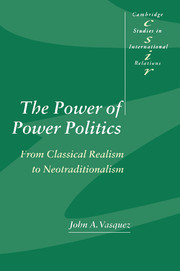Book contents
- Frontmatter
- Contents
- List of figures
- List of tables
- Preface
- Introduction
- Part I The Original Text: Classical Realism and Quantitative International Politics
- Preface to Part I
- Acknowledgments
- 1 The role of paradigms in scientific inquiry: a conceptual framework and a set of principles for paradigm evaluation
- 2 The role of the realist paradigm in the development of a scientific study of international relations
- 3 Research design: defining and operationalizing the realist paradigm
- 4 Theory construction as a paradigm-directed activity
- 5 Data making as a paradigm-directed activity
- 6 Research as a paradigm-directed activity
- 7 Evaluation: the adequacy of the realist paradigm
- 8 Theory and research in the 1970s: the emerging anomalies
- Part II Neorealism and Neotraditionalism: International Relations Theory at the Millennium
- References
- Name index
- Subject index
- CAMBRIDGE STUDIES IN INTERNATIONAL RELATIONS
6 - Research as a paradigm-directed activity
Published online by Cambridge University Press: 22 September 2009
- Frontmatter
- Contents
- List of figures
- List of tables
- Preface
- Introduction
- Part I The Original Text: Classical Realism and Quantitative International Politics
- Preface to Part I
- Acknowledgments
- 1 The role of paradigms in scientific inquiry: a conceptual framework and a set of principles for paradigm evaluation
- 2 The role of the realist paradigm in the development of a scientific study of international relations
- 3 Research design: defining and operationalizing the realist paradigm
- 4 Theory construction as a paradigm-directed activity
- 5 Data making as a paradigm-directed activity
- 6 Research as a paradigm-directed activity
- 7 Evaluation: the adequacy of the realist paradigm
- 8 Theory and research in the 1970s: the emerging anomalies
- Part II Neorealism and Neotraditionalism: International Relations Theory at the Millennium
- References
- Name index
- Subject index
- CAMBRIDGE STUDIES IN INTERNATIONAL RELATIONS
Summary
The proposition
Kuhn maintains that the chief characteristics of normal science are that research is guided by the dominant paradigm and that research is seen as a puzzle-solving activity (Kuhn 1970a: ch. 4). In normal science, the scientist's primary role is to develop hypotheses to explain puzzles that the paradigm has focused upon. One of the significant characteristics of this research, according to Kuhn (1970a: 146–148), is that the paradigm's failure to resolve puzzles does not lead to the falsification of the entire paradigm, but to incremental changes known as paradigm articulation. Persistent failure to resolve puzzles is not seen as a flaw in the paradigm but as a flaw in the individual scientist (Kuhn 1970a: 35–36). Thus, while Karl Popper's (1959) notion of falsification may be applied to individual hypotheses and even to theories, it is never applied to the most fundamental assumptions of the field, that is, the paradigm (Kuhn 1970a: 146–148). Hypothesis testing in normal science tends to be a process of testing competing hypotheses “derived” from the same paradigm rather than testing hypotheses derived from competing paradigms (Kuhn 1970a: 24). The latter, if it occurs at all in science, occurs during periods of scientific revolution and is then viewed as more of a change of world view than of testing hypotheses from competing paradigms. (Kuhn 1970a: ch. 10).
- Type
- Chapter
- Information
- The Power of Power PoliticsFrom Classical Realism to Neotraditionalism, pp. 104 - 120Publisher: Cambridge University PressPrint publication year: 1999

